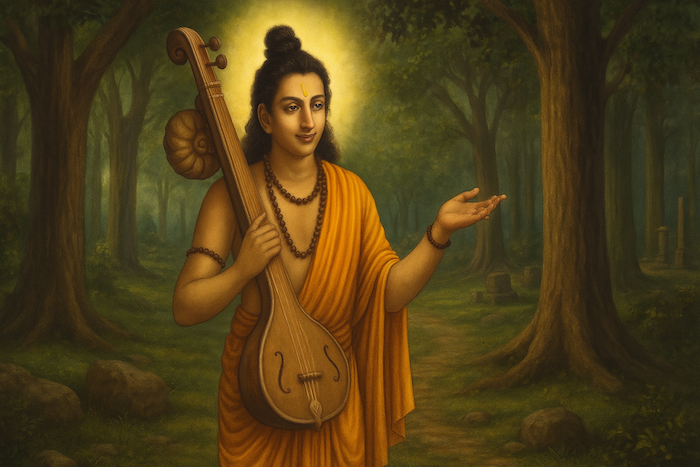
Ancient Wisdom Series
Narada
Music & Devotion
- A Devarishi (celestial sage) who moves freely between worlds, gods, humans, and demons
- Known for spreading bhakti (devotion), carrying divine knowledge, and playing the veena (string instrument)
- Appears in nearly every major Hindu scripture: Vedas, Upanishads, Ramayana, Mahabharata, Puranas, and Bhagavata Purana
- Famous for provoking events (sometimes chaos!) that ultimately lead to Dharma and divine purpose
- Believed to be a Chiranjivi (immortal) who appears in every yuga (cosmic age)
Family Lineage / Gotra
father
Brahma
The creator god (in some accounts)
alternateOrigin
Maidservant's Son
In the Bhagavata Purana, born to a maidservant who served sages, and became a sage himself due to their blessings and bhakti
His divine birth in multiple traditions reflects his timeless role across dimensions — as a consciousness awakener
Key Texts
Narada Bhakti Sutra
A short, profound text outlining the path of pure devotion (Bhakti Yoga). Declares bhakti as the easiest and highest path to liberation. Speaks of love as God, God as love, and devotion as its own reward
Mentions in Sacred Texts
Prominently mentioned in Bhagavata Purana, Mahabharata & Ramayana (as spiritual consultant and catalyst), and numerous Puranas
Interesting Stories
Instigating the Mahabharata
Narada advised Vyasa to write something more spiritually nourishing after the Vedas and Puranas — leading to the Bhagavata Purana, focused on devotion
His suggestions and appearances shaped the Mahabharata's deeper purpose, including Krishna's eventual role
Meeting Valmiki
Narada meets the bandit Ratnakar, guides him toward reflection, and initiates him into the mantra 'Rama'
This man becomes Valmiki, the author of the Ramayana
Narada then narrates Rama's story to him, which becomes the Ramayana — showing how he seeds divine stories into time
Narayan Narayan!
Constantly chants 'Narayan Narayan!' — the name of Lord Vishnu — while strumming his veena
Even while seeming mischievous or nosy, his every act leads beings toward dharma and liberation
The Pot of Oil (The Lesson to Narada)
Once proud of his devotion, Narada asked Vishnu who his greatest devotee was
Vishnu showed him a humble farmer who remembered the Lord only twice a day, yet did so with full awareness — while Narada forgot while carrying oil on his head
This taught Narada that sincerity matters more than frequency
Contributions and Insights
Bhakti Yoga: Narada established love for God as a valid and supreme spiritual path
Divine Communication: Acts as a messenger between worlds, reminding us that the divine operates even through chaos and surprise
Arts and Music: Patron of celestial music and sound (Nāda Yoga) — using music as a form of devotion and transmission
Spiritual Trickster: Often appears as a troublemaker whose actions lead to divine revelations or karmic resolution
Spiritual Symbolism
Narada represents Movement (he never stays still), Devotion in action, Sound as divine vibration, and Unattached wisdom
He's the playful energy of the universe — shaking things up so that hidden truths emerge
Why is he 13th on the list?
After the rational brilliance of Kapila, Narada brings in joy, heart, humor, and divine unpredictability
He shows that spirituality doesn't have to be dry or silent — it can sing, joke, dance, and provoke
His presence adds a narrative flow, bridging wisdom between stories and sages — making him an ideal messenger in your ongoing chronicle
Lineage & Timeline
Satya Yuga
~2.16 million years
The first and most virtuous age where dharma stood on all four legs. Many Rishis including Vashishtha and Vishwamitra lived during this time.